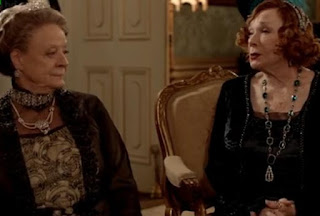SPOILER ALERT!
 |
| Showdown between the Dowager Countess and Mrs. Levinson. |
Like many of you, I was glued in front of my TV--well, actually, my friend's TV--for the much-hyped and anticipated premiere of the third season of
Downton Abbey. It's now 1920. The Great War is over, and life presumably can return to some semblance of normality. I was eager to see if Lady Mary and Matthew actually make it down the aisle, how Mr. Bates is faring in prison, whether Lady Sybil and Branson return from Ireland, and what new schemes Thomas and Mrs. O'Brien concoct. My answer to all of these questions were felicitously answered, but what I found particularly striking was the larger social commentary on change. Lord Grantham has lost almost all of his wife's money through a bad investment in a bankrupt railway, which puts the very survival of Downton Abbey at risk. The Crawley family may have to sell their estate and move into smaller and more modest digs. The Dowager Countess and Lady Mary attempt to bamboozle Lady Grantham's mother, played by the incomparable Shirley MacLaine, into forking over the money to keep the estate afloat, but Mrs. Levinson politely declines. She observes to them, and to the Earl himself, that houses like Downton Abbey belong to a bygone era, and that one must adapt to changing circumstances to survive.
 |
FDR at St. James Episcopal Church, Hyde Park, NY, 1935
|
I found this motif that runs throughout the first episode to be relevant to how we think about the Church, as well. Like the antebellum landed aristocracy, the Church is an institution that operates under a set of rules, conventions, expectations, and structures that are grounded in a particular time period. The problem is that this infrastructure falters and puts the institution at risk when the conditions around it change. We, too, must adapt in order to survive. Unfortunately, a common response to the threat of our demise is to throw everything old away and start over, to claim that we have done everything wrong and then scramble--sometimes rashly and haphazardly--to find new things that work. That is hardly a healthy solution. The real challenge, which
Downton Abbey raises, is how to adapt and yet still be who we are at our core. Any identity crisis, whether Church or British aristocracy, requires deep soul-searching to determine what is essential and must be preserved, and what is outmoded and can be discarded. As I often say, being who we are necessitates a healthy tension between continuity and discontinuity, to avoid the equally unhealthy extremes of rigidity and chaos. The Church must be grounded in something enduring, but we cannot be slaves to our institutions, either.




Good posting and so true. The repartee between MacLaine and Smith was great.
ReplyDelete'Downton Abbey' seems to have passed me by so far (seen part of one episode) but I may catch up one day. Right, that tension between change and continuity. Of course the church, unlike the peerage or a mansion household, has a divine charter so it'll never pass away on earth; locally's another matter. But yeah. The difference between the Catholic renewal at the Counter-Reformation and the 'Reformation' that caused it, or between that and Vatican II or, before that, the loss of faith at the 'Enlightenment' that did a number on the mainline denominations. As a conservative Roman Catholic I have a different line/balancing point for change/continuity than you (our cousins, liberal high church) but the idea remains.
ReplyDelete